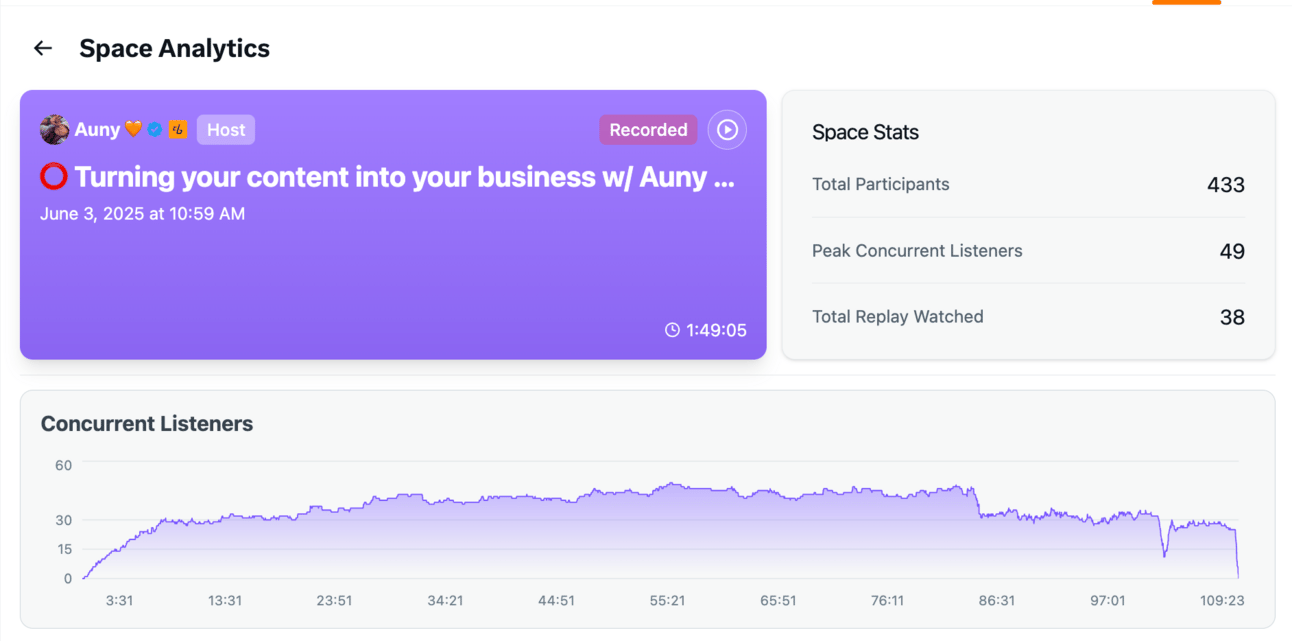Welcome To: From Stutter to Spotlight
I hosted my first Space with sweaty palms and 5 polite listeners. Today, I hold rooms of 500+ and run the mic like it owes me rent. This article is how I got here; minus the fluff, PLUS every cheat code I know and personally use for my spaces everyday.
Why Spaces Still Matter
It’s 2025 and attention spans are shorter than ever; but live audio cuts through the noise.
A great Space builds community, positions you as a thought leader, and multiplies reach (your network) faster than any single post. Hosting one isn’t about luck. It’s about preparation, precision, and presence. This is everything I wish I had BEFORE my first space.
1st OFF → Host Mindset: You Are the ‘Conductor’
Your job as the host isn’t just to talk. It’s to guide.
Set the tone. Create momentum. Make every speaker and listener feel like they’re part of something intentional.
Before you go live, get clear on three things:
The vibe → Do you want listeners to feel inspired, informed, challenged or connected?
Outcome → Are you aiming for deeper engagement, education, community growth, or just a memorable convo?
Timing → Start strong. End stronger. Never drag a dying convo. It’s a skill to end on a note that leaves people wanting more
Key Principles
❥ Show authority without ego – guide firmly, but there’s no need to be rude.
❥ Curate in real time – Come prepared, but stay flexible. Play off of the conversation, not just notes.
❥ Control the flow – If silence stretches too long, jump in. Redirect. Reset. Keep the ‘pulse’ alive.
Spaces without direction is just another group chat. A good host turns their spaces into an experience.
Picking Topics
Here are 5 tips to help you pick a strong topic for your Space:
Solve a specific problem – Choose a topic that answers a question your audience is already asking. Clarity > cleverness.
Pull from your best-performing posts – If a tweet did numbers, it’s proof the topic resonates. Expand on it live.
Align with your brand voice – Don’t host random Spaces. Pick topics that reflect your niche, style and what you want to be known for.
Spot what’s missing – Notice what people aren’t talking about and fill that gap. Originality grabs attention.
Make it easy to join – Go with something people can jump into without needing prep. Relatable > technical.
Listeners show up for specific value. Not everyone is interested in everything. So you’ll always have different people who tune in to speak or listen to different spaces.
Craft a main theme, then stack three micro‑topics that branch naturally.
Example for a Personal-Branding Space, these could be your sub-topics:
What colors do you think represents your brand?
How do you define your content-pillars.
How do you manage the relationships you build through your brand?
Each sub‑topic is a reset point if the “energy” dips.
📡 PSA for My Fellow Hosts & AI-Curious Creators:
Wanna sound smarter on Spaces? Find interesting AI trending topics?
🧠 I don’t scroll news. I read The Rundown — the most trusted AI newsletter with 1M+ readers.
They break down all the latest AI tools, trends, and tech—in plain English. It’s free. Takes 5 min. And yes, I actually learn something new every time.
Stay up-to-date with AI
The Rundown is the most trusted AI newsletter in the world, with 1,000,000+ readers and exclusive interviews with AI leaders like Mark Zuckerberg, Demis Hassibis, Mustafa Suleyman, and more.
Their expert research team spends all day learning what’s new in AI and talking with industry experts, then distills the most important developments into one free email every morning.
Plus, complete the quiz after signing up and they’ll recommend the best AI tools, guides, and courses – tailored to your needs.
Moderation
Most people are too polite to interrupt speakers. Huge mistake!
Sometimes, speakers or even co-hosts don’t realize they’re “rambling” when they’re on a roll. Don’t ever be afraid to politely interrupt. Steer the convo.
Your audience will thank you.
How do you know when to interrupt?
Pay attention to the reactions people are throwing up
(yes, keep scrolling down to see what your listeners are up to)
→ When people are enjoying what’s being said, you’ll see them throwing reactions
→ When they’re not really reacting, they might be tuning it out or are bored
🧡 Real‑Time Pulse Check:
Throw a random joke in there to make people laugh / re-engage.
Watch the listener count 📈/📉
Small dips = audience fatigue
→ Pivot to questions or inject mini‑recaps to pull people back.
→ Reset the room: ask people to leave a comment or repost the space.
→ Light banter with your co-hosts is a great way to snap attention back in!
BTW ... The “Purple Pill” is a huge tool
Always tell your audience to drop comments or questions there with a promise to read them out live or reply after the space.
Why?
It makes them part of the conversation even if they’re “just listening”
When there’s activity and engagement on the spaces post, it boosts the space in the
algo!
Purple‑Pill Comment Funnel
→ Encourage people to comment on the spaces post (purple pill)
→ Like + Repost the space reminders are crucial for exposure
Bonus points if you can tie in something fun for the reposts.
Example: I like to say “i’ll sp*nk you if you don’t repost 😉”
One of my friends likes to say “i’ll shave my head if we get to 50 reposts”
It’s a great way to get your space out there + keep your audience engaged.
Behind‑the‑Scenes Coordination
Great Spaces sound seamless; but that takes silent coordination behind the mic.
Always create a group DM with your co-hosts (or any backchannel comms open) to manage:
• Timing cues → “Let’s wrap this in 2”
• Speaker suggestions → “Let’s get to @user next”
• Queue management → Who’s up, who’s next
• Topic pivots → Quick shifts when convo stalls
• Tech issues → Mic glitches, dropped connections etc.
→ Even stuff like → “BRB, bathroom break 🫣” 😂 🤫
Co-ordination with your cohosts is extremely important when it comes to keeping the conversation flowing without interruption or “dead-air”
Voice & Delivery: Say Less, Impact More
Your voice is your first impression.
Clear, confident delivery builds instant trust; even before people know your name or understand the context of the conversation.
Practice:
• Clarity – enunciate; avoid filler words.
• Pacing – slow down to emphasize, speed up to energize.
• Tone – project when needed, soften to pull people in
Pro Tip:
I listen back to almost every space i speak on or host to understand key areas I can improve on. Ask yourself:
Did I address questions correctly?
Was I rambling or stuttering?
Could I have used less filler words?
Could I have been more concise?
Asking yourself these questions will allow you to be more self-aware next time (it comes with practice).
Self-awareness turns a good host into a great one.
Additional (Optional) Prep
Additional (Optional) Prep
• 1‑page topic outline (use Google Doc or Notion)
• Bullet list of questions (highlight the ones you REALLY wanna discuss)
• Opening & closing scripts (15 sec each - even if it’s a list of call to actions)
Pro Tip:
When you’re new (or even seasoned), keep some kinda writing material handy so you can quickly jot down pointers from when people are speaking so you can refer back to them if needed... or even things to remind yourself to say as you go.
Growth, Analytics & Long-Term Reach
The Space might end; but your impact shouldn’t.
Here’s how to turn one good space into long-term momentum:
Track strong speakers → DM them later and invite them back.
Review analytics → Watch for drop-offs and peak moments. What worked? What dragged?
Reply to comments → Keep the convo going under the “purple pill” (preferably after the space because your focus should be on the convo)
Repurpose content → Post key takeaways, funny moments, replay links, and tag speakers to boost reach.
DM your co-hosts + speakers → A simple “thank you” builds loyalty. When you host your next space... guess who’s coming back?
Every Space is a seed. How you follow up determines how far it grows.

Resources & Checklists
Pre-Space Setup:
✔ Topic & sub‑topics ready
✔ Co‑hosts confirmed in DM
✔ Scheduled tweet posted
During the Space:
✔ Pin a CTA tweet to the Jumbotron (e.g. “Repost the Space” or a relative post)
✔ Introduce your co-hosts (say hi to them one by one to set the tone)
✔ Activate your speakers:
- Call out their names and say Hi (+ thank for coming)
- Let the people know if it’s hand-raise only or open mic
Pro Tip:
Don’t leave people hanging; if you don’t acknowledge speakers, it creates awkward energy. They won’t know when (or if) to jump in.
Know when to end:
✔ There’s no perfect length.
If it’s flowing → keep going (while being respectful of everyone’s time ofcourse)
If it’s the convo starts to feel flat → wrap it up.
Always better to leave people wanting more.
Great Spaces feel effortless because the host (YOU) did the work beforehand.
Treat every space like a live show: prep, perform, iterate.
Do that, and the algorithm won’t be the only one boosting you; your community will too.
Now go take ACTION. Host your first space today...
If you need a co-host or speaker... you know where to find me (no seriously... DM me) 😊
Buy Me A Coffee
Would mean the world to me if you connect with me there. Will be publishing FREE ebooks for everyone to learn from (starting today):
That’s it for this edition of Explained Without Fluff.
Hope this helped. See you on the next one.
— Auny 🧡
BTW, definitely sign up for BeeHiiv
It’s an amazing tool if you want to monetize yourself via newsletters
⬇




